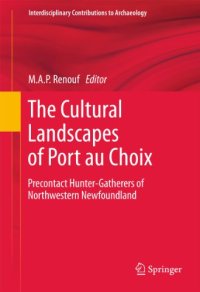
Ebook: The Cultural Landscapes of Port au Choix: Precontact Hunter-Gatherers of Northwestern Newfoundland
- Genre: History // Archaeology
- Tags: Archaeology, Anthropology, Human Geography, Geology
- Series: INTERDISCIPLINARY CONTRIBUTIONS TO ARCHAEOLOGY
- Year: 2011
- Publisher: Springer US
- Edition: 1
- Language: English
- pdf
Newfoundland lies at the intersection of arctic and more temperate regions and, commensurate with this geography, populations of two Amerindian and two Paleo-eskimo cultural traditions occupied Port au Choix, in northern Newfoundland, Canada, for centuries and millennia. Over the past two decades The Port au Choix Archaeology Project has sought a comparative understanding of how these different cultures, each with their particular origin and historical trajectory, adapted to the changing physical and social environments, impacted their physical surroundings, and created cultural landscapes. This volume brings together the research of Renouf, her colleagues and her students who together employ multiple perspectives and methods to provide a detailed reconstruction and understanding of the long-term history of Port au Choix. Although geographically focussed on a northern coastal area, this volume has wider implications for understanding archaeological landscapes, human-environment interactions and hunter-gatherer societies.
Newfoundland lies at the intersection of arctic and more temperate regions and, commensurate with this geography, populations of two Amerindian and two Paleoeskimo cultural traditions occupied Port au Choix, in northern Newfoundland, Canada, for centuries and millennia. Over the past two decades The Port au Choix Archaeology Project has sought a comparative understanding of how these different cultures, each with their particular origin and historical trajectory, adapted to the changing physical and social environments, impacted their physical surroundings, and created cultural landscapes. This volume brings together the research of Renouf, her colleagues and her students who together employ multiple perspectives and methods to provide a detailed reconstruction and understanding of the long-term history of Port au Choix. Although geographically focussed on a northern coastal area, this volume has wider implications for understanding archaeological landscapes, human-environment interactions and hunter-gatherer societies.